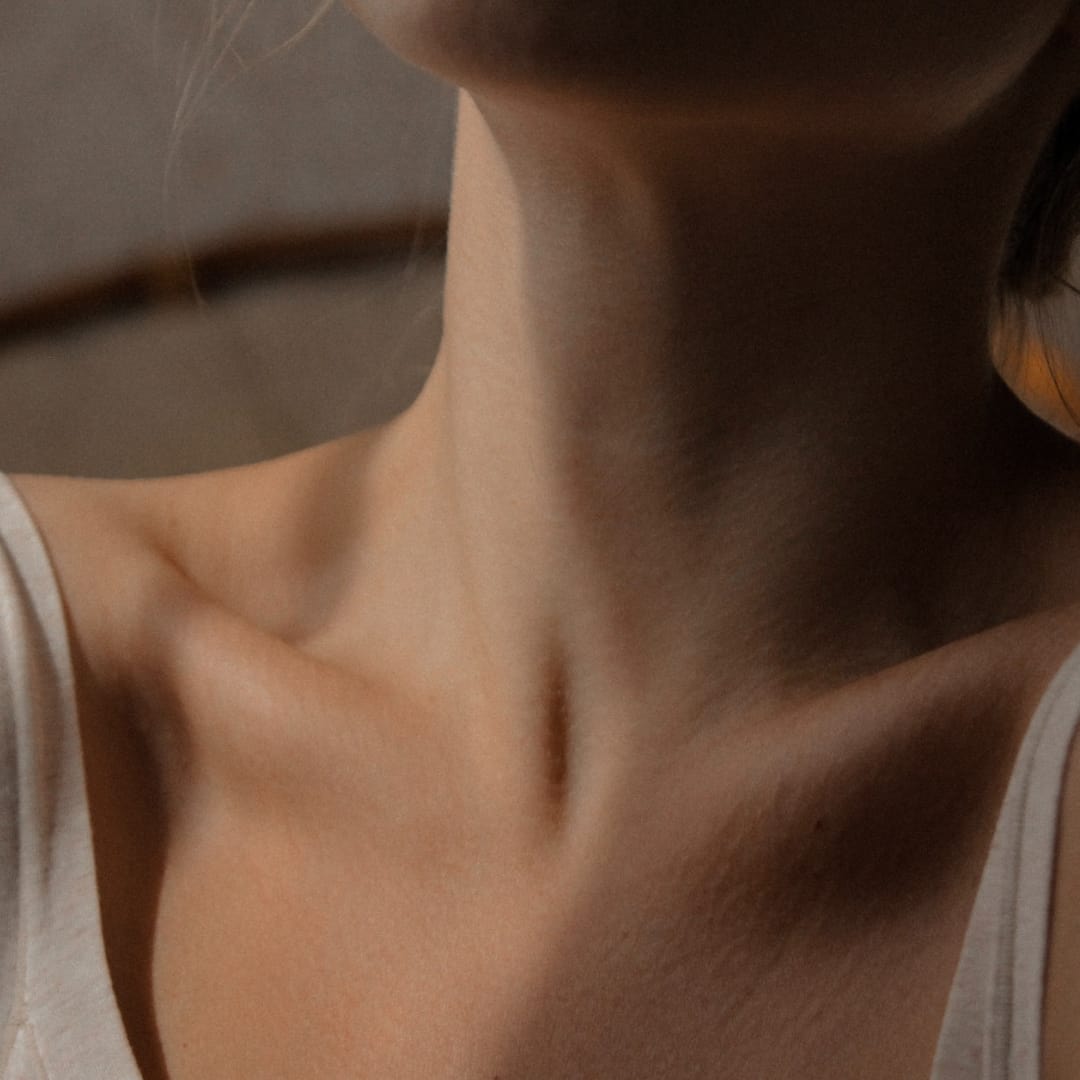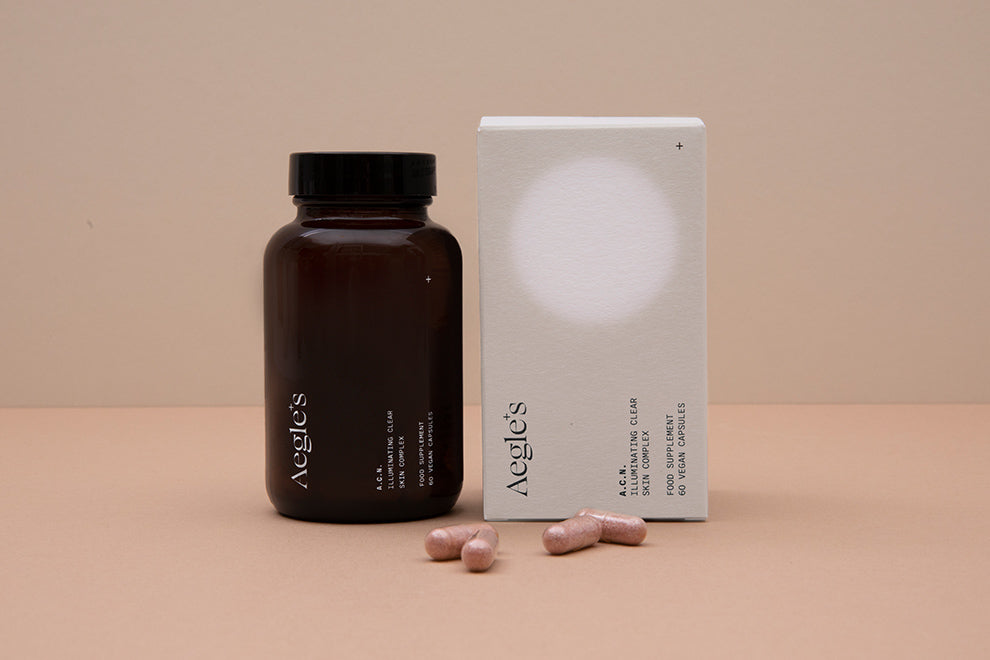

Hypothyroidism is a disorder of the endocrine system that is one of the less common root causes of acne in women.
This article will discuss what hypothyroidism is, and how the condition can cause acne.
What is hypothyroidism?
The thyroid is a butterfly-shaped gland located in the neck that produces hormones that regulate energy, along with many other important functions.
Hypothyroidism is an underactive thyroid, meaning the thyroid gland is not producing enough thyroid hormones. Some of the symptoms of hypothyroidism include fatigue, depression, weight gain and constipation.
Onset of hypothyroidism is typically between the ages of 20-50 years old, which makes it a condition that naturally falls within the age bracket of when women can experience acne as an adult.
However, hypothyroidism in itself is not a direct cause of acne. So let’s take a look at the link between the thyroid and acne, and how having hypothyroidism can result in acne in women.
How can hypothyroidism cause acne?
Hypothyroidism is not a direct cause of acne in itself, as the dominant hormones that are affected by an underactive thyroid are not a direct cause of acne. In fact, hypothyroidism can lower testosterone which can reduce the potentiality of acne.
However, there are a handful of indirect links between hypothyroidism and acne, such as chronic inflammation, low progesterone and an excess or deficiency in vitamin A.
Chronic inflammation
Hypothyroidism causes low grade chronic inflammation in the body. And as acne is an inflammatory skin condition, the inflammation caused by hypothyroidism can worsen a pre-existing acne condition.
Chronic inflammation can be caused by many different imbalances in the body. If you are concerned that you may have chronic inflammation, it is recommended to make an appointment with a certified nutritional therapist.
Low progesterone
A healthy functioning thyroid gland is necessary for the production of sufficient levels of progesterone. So when a woman has an underactive thyroid (hypothyroidism), she can also become deficient in progesterone.
Healthy progesterone levels are essential for helping to regulate healthy sebum production. It is progesterone that is responsible for calming down excess sebum production in the two week window leading up to the first day of bleeding in a woman’s menstrual cycle. When a woman experiences a worsening of acne in this two week window before bleeding, it is often low progesterone which is the primary cause.
It’s important to note that as we get older our skin produces less sebum. So in a case where low progesterone caused by hypothyroidism is the direct cause of a woman’s acne, it is likely when she is under the age of 40 when the sebum production is still in excess before her menstrual cycle.
Thyroid and vitamin A
Vitamin A is essential for clear and healthy skin. Vitamin A in combination with healthy thyroid hormones is also essential for healthy progesterone production, which again is essential for clear and healthy skin.
However, vitamin A in excess can suppress healthy thyroid hormone production, which is where it gets somewhat complicated. In essence, vitamin A intake needs to be in the correct balance in the body for both healthy thyroid function and clear skin.
Vitamin A deficiency can result from inadequate intake in the diet, liver disorders, or fat malabsorption.
That best place that we can always get our vitamins from, and in a perfect balance, is through food. Good sources of vitamin A are liver, eggs and oily fish.
The body also converts beta-carotene into vitamin A, so consuming foods with beta-carotene is a good way to ensure sufficient levels of vitamin A. Foods that contain beta-carotene include yellow and green leafy vegetables, and yellow fruits such as mango, papaya and apricots.
Hypothyroid medication
The pharmaceutical medication used in the treatment of hypothyroidism can be the cause of the acne itself. In some cases if the medication is too high for what the woman’s body needs, the side effect can be acne.
It is recommended that if a woman’s acne begins after initial pharmaceutical treatment of hypothyroidism, that she consults with her doctor for alternative medication.
How to treat hypothyroid acne
Even though hypothyroidism itself doesn’t directly cause acne, it is still important to treat the condition if it is a part of the cause.
The most common cause of hypothyroidism is a deficiency in iodine, which is usually diet related. This can be from too little iodine in the diet, or from a diet high in cruciferous vegetables which bind to iodine and remove it from the body.
It’s important to note that for women without a thyroid condition the consumption of cruciferous vegetables is part of a healthy and balanced diet. However, consuming cruciferous vegetables in excess over a long period of time can lower iodine levels to form a deficiency.
It is recommended that women who have a hypothyroid condition avoid all consumption of cruciferous vegetables in their diet.
If a woman is experiencing acne from hypothyroidism, whether it be from chronic inflammation, low progesterone levels or from the pharmaceutical medication that she’s taking, it’s beneficial to make an appointment with a medical professional. This can be either a certified nutritional therapist or doctor.
Hashimoto's thyroiditis
Hashimoto’s is an autoimmune disease that causes hypothyroidism without a deficiency in iodine. Its cause is usually genetic or environmental factors.
Hashimoto’s thyroiditis is conventionally treated using the same pharmaceutical medication as iodine deficiency hypothyroidism. It is also recommended that women with hashimoto’s avoid the consumption of high levels of iodine, but it is important to note that small levels of iodine in the diet is important, especially for pregnant women.
In conclusion
While there is no direct relationship between hypothyroidism and acne, having an underactive thyroid can indirectly contribute to or cause acne in women.
If you are a woman with both hypothyroidism and acne, it is recommended to make an appointment with a certified nutritional therapist to discuss your treatment options.

Start your journey to heal your skin now.
- Contains ingredients clinically proven to improve blemishes and skin radiance.
- Formulated by one of the world's leading skin practitioners.
- The only supplement that works for the three main causes of blemishes, blackheads and oily skin.






